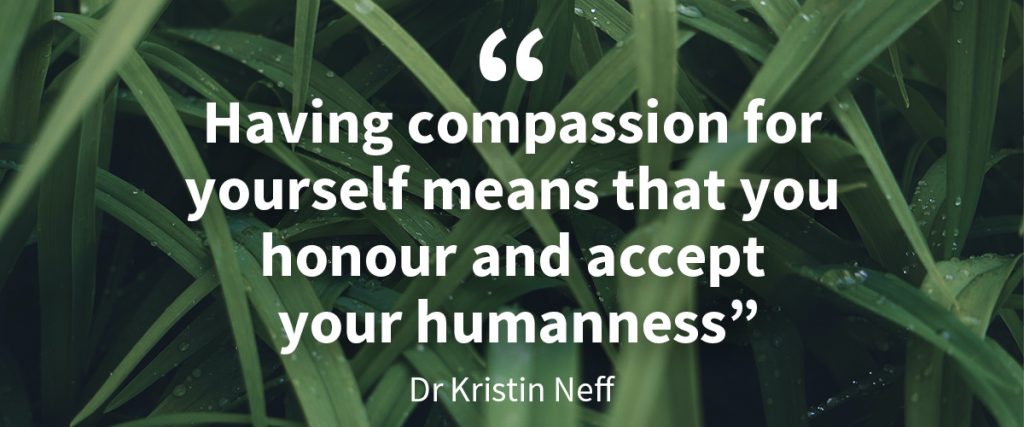The transformative practice of self-compassion

I believe that practicing self-compassion is the single most transformative thing any of us can do to protect our wellbeing and mental health. As a resilience researcher, I see what the science says. As a psychologist, I have witnessed many times over just how big an impact it can make. As someone who suffered significant physical and emotional burnout and trauma, I can honestly and wholeheartedly share that it was the practice of mindful self-compassion that restored my physical and mental health.
Self-compassion is however something few of us have managed to get our heads around. In fact, for a great number of us self-compassion is a foreign concept, utterly at odds with the “harden up,” “push on through,” achievement-centred culture that we have grown up in. We worry that practising self-compassion will make us self-indulgent or weak or prevent us from attaining the perfection that we have strived so hard for.
Unlearning self-criticism as a step to self-compassion
Research by Professor Kristin Neff in the United States has consistently found that most of us hold ourselves to impossible standards, compare ourselves to unrealistic ideals and become harshly self-critical when we inevitably fall short. Professor Neff found that we buy into the idea that self-criticism somehow “keeps us in line”, when in fact persistent self-criticism can be detrimental to our mental health.
Without self-compassion, the very human experience of making mistakes, can lead to feelings of deep inadequacy, unworthiness and shame. We easily take on the idea that it’s not safe to make mistakes – or that it is harmful to our sense of self-worth to do so.
In my private practice I frequently witness how many people put their own needs behind a long list of other priorities and push themselves to absolute exhaustion, just trying to get it all done. This is especially the case for those working in service-to-others occupations as well as parents and carers. The value of being of service and conscientiousness seem to dominate and people truly struggle to give themselves permission to take care of themselves and nourish their own wellbeing.
A personal journey to self-compassion
It took me time to truly engage in self-compassion. I could extend bottomless waves of compassion outwardly – to family, to friends, to my clients, to my colleagues, to strangers and to animals. At times I could extend self-compassion to myself, but it was conditional. It wasn’t until I was forced to take time off work due to severe burnout and physical illness that I came face-to-face with how I was actually engaging in “self-care”.
Through many angry tears, painful days and restless nights I realised that I used self-care as a “reward” for getting work done; for good behaviour. I used a carrot and stick approach with my own self-compassion.
On the long road back to restoring my physical and mental health (a road I continue to walk) I realised that my own sense of worthiness was still pinned on doing, on achieving, on consistently pleasing others. Through work with my own mentor/therapist, I knew this stemmed from years of bullying in primary school and trauma I experienced as a teenager. These experiences planted the seed for a limiting belief to take root and weave its way through many areas of my life.
This limiting belief undermined my sense of worthiness. To be safe in the world I needed to study really hard, do good things, fly under the radar and be really good to others, all the time, without exception. If I couldn’t do this – how would I feel safe, feel worthy? I managed to keep this going for 35 years.
Needless to say, this is an exhausting way to live. I came face to face with this harsh truth when I could no longer do any work at all, when the cognitive fatigue and physical pain was so intense that all my body wanted to do was sleep. I had to learn to give myself permission to sleep, to rest, to nourish my mind and body. I had to learn how to befriend my body again. I cannot begin to describe how humbling this was.
When I did have energy, I listened to short mindful-compassion meditations and would often fall asleep again at the end! I very slowly re-read books by Christopher Germer, Paul Gilbert, Tara Brach, Rick Hanson and Kristin Neff. I read poetry and listened to music, I walked very short distances, very slowly and listened to the wisdom of Tara Brach and Ram Dass. I frequently hugged my husband, my aunt and brother and allowed myself to be comforted by their warmth, kindness and reassurance. When I eventually returned to private practice 9 months later, this experience had completely humbled me. It transformed my therapeutic approach and the relationship I have with my own mind and body.
What I finally and painfully realised was that as human beings we desperately need to trust our own innate goodness. We need to deeply recognise that we are worthy of this kindness and care – worthy right now – not when we have “achieved” something or “ticked everything off the to-do list”.
The benefits of practising self-compassion
Over the years I found that when my clients made that shift, tremendous healing would unfold. They began to recognise that each and every time they engaged in an act of self-care and self-compassion and held boundaries to protect these routines, they were giving themselves a subtle yet powerful message “I am worthy of this care and kindness – worthy just for being who I am”. They also recognised that these mindful-compassion practises restored vital energy and internal resources to help them honour all the important values in their lives.
Today my daily life embodies the practise of mindful self-compassion and proactive self-care. This fills my cup and allows me to take care of the values I hold dear from the overflow. I am consistently learning and growing from this practise and from those who I am fortunate enough to share these practises with through my work at Mindarma. It is still however a practise, it takes commitment and I go off course at times – but the difference is that now I treat this too with kindness and recognise my humanness. I see that this is also very much part of the practise – learning how to trust, forgive and give back to ourselves without judgement. As the poet Derek Walcott shares “Give wine. Give bread. Give back your heart to itself, to the stranger who has loved you all your life, whom you ignored for another, who knows you by heart.”
Dr Sadhbh Joyce is the Senior Psychologist and Co-Founder of Mindarma. At Mindarma, mindful self-compassion and proactive self-care are taught as core practises that can bolster our psychological resilience and protect long-term wellbeing and mental health. You can explore a mindful compassion practise here.
